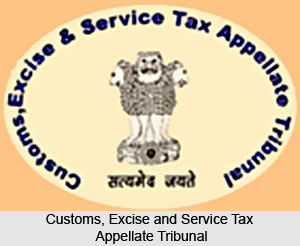 The Customs, Excise and Service Tax Appellate Tribunal (CESTAT) was formerly known as Customs, Excise & Gold (Control) Appellate Tribunal (in short CEGAT). It was constituted on the 11th October 1982. CESTAT was created to provide an independent forum to hear the appeals against orders and decisions passed by the Commissioners of Customs and Excise under the Customs Act, 1962, Central Excise Act, 1944, Finance Act 94 relating to Service Tax. The Tribunal is also empowered to hear the appeals against orders passed by the designated authority with regard to Anti Dumping Duties under the Customs Tariff Act, 1975. In classification and valuation matters, the appeal against the order of the Tribunal lies only to the Honourable Supreme Court of India. The CESTAT strives to dispose off the appeals as early as possible and deliver the Judgments within well defined time frame.
The Customs, Excise and Service Tax Appellate Tribunal (CESTAT) was formerly known as Customs, Excise & Gold (Control) Appellate Tribunal (in short CEGAT). It was constituted on the 11th October 1982. CESTAT was created to provide an independent forum to hear the appeals against orders and decisions passed by the Commissioners of Customs and Excise under the Customs Act, 1962, Central Excise Act, 1944, Finance Act 94 relating to Service Tax. The Tribunal is also empowered to hear the appeals against orders passed by the designated authority with regard to Anti Dumping Duties under the Customs Tariff Act, 1975. In classification and valuation matters, the appeal against the order of the Tribunal lies only to the Honourable Supreme Court of India. The CESTAT strives to dispose off the appeals as early as possible and deliver the Judgments within well defined time frame.
Organisation of CESTAT
The sanctioned strength of the Members (including President and two Vice Presidents) is 21.It has 3 benches in Delhi and 4 benches in Mumbai and one each at Kolkata, Chennai and Bengaluru. Each Bench consists of a Judicial Member and a Technical Member. With a view to have expeditious disposal of small cases, a Bench of Single Member deals with the matters not exceeding Rs.10 Lakhs is also constituted. Except in the matters relating to classification and valuation of goods, the Tribunal is the final Appellate Authority though a reference to the High Court can be made on a question of Law.
Functions of CESTAT
The work of the Tribunal has been distributed among various Benches, comprising Special Benches located at Delhi and Regional Benches, one each located at Delhi, Mumbai, Kolkata, Bengaluru and Chennai. Special Benches deal with matters relating, among other things, to disputes about the rate of duty of custom or of excise or to the value of goods for purposes of assessment of duty of customs or of excise (referred to as valuation disputes). Special Benches consist of not less than two members, at least one being a Judicial Member and one a Technical Member. Regional Benches deal with matters other than those falling within the jurisdiction of the Special Benches. These consist of two Members - one a Judicial Member and one a Technical Member. There is also a provision for Single Member Benches which are competent to dispose of cases within the specified monetary limits falling within the jurisdiction of Regional Benches
The Tribunal has to hear and dispose of appeals and revision applications which were being dealt with by the Central Board of Excise and customs and the Ministry of Finance (Department of Revenue) under the three enactments, namely- the Customs Act, 1962 (referred to for convenience as the Customs Act); Central Excises And Salt Act, 1944 (Preferred to for convenience as the Central Excises Act) and Gold (Control) Act 1968 (referred to for convenience as the Gold (Control) Act) prior to 11.10.1982 and which were pending on 10.10.1982.). It also disposes of fresh appeals, filed on or after 11.10.1982. However, appeal against orders of Collectors of Customs (Appeals) and Collectors of Central Excise (Appeals) in respect of certain subjects. These are- baggage, short-landed goods and drawback of duty, under the Customs Act,1962, storage and transit losses and export of excisable goods whether in bond without payment of duty or on payment of duty under-claim for rebate, under the Central Excises and Salt Act, 1944.
The order of the Tribunal in any particular involving inter-alia, a dispute regarding rate of duty or valuation of goods, is final, subject to an appeal to the Honourable Supreme Court. In any other matter, the order of the Tribunal is final on any question of fact: on a question of law in any such matter, the order of the Tribunal is subject to the decision of the High Court or of Supreme Court, as the case may be, on a reference made to the High Court or Supreme Court by the Tribunal.
In view of the limited number of staff in the Registries of the Regional Benches, it may not always be feasible for those Benches to follow in toto the procedures followed by the Central Registry in New Delhi, Minor departures necessitated by local condition may be authorized by the Senior Member of the Regional Bench, who will oversee and guide the working of the Regional Registry. Such departures should however be brought to the notice of the President through the Registrar.






